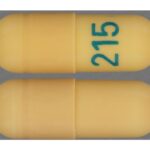SG 180 Pill: Uses, Dosage, Side Effects, Interactions

The yellow capsule-shape pill with the imprint SG 180 has been identified as Gabapentin 300 mg supplied by ScieGen Pharmaceuticals, Gabapentin is in a class of medications called anticonvulsants. Gabapentin treats seizures by decreasing abnormal excitement in the brain. Gabapentin relieves the pain of postherpetic neuralgia (PHN; the burning, stabbing pain or aches that may last for months or years after an attack of shingles) by changing the way the body senses pain. It is not known exactly how gabapentin works to treat restless legs syndrome.
Yellow Capsule SG 180 is used along with other medications to help control certain types of seizures in people who have epilepsy. It is also used to relieve the pain of postherpetic neuralgia and to treat restless legs syndrome (RLS; a condition that causes discomfort in the legs and a strong urge to move the legs, especially at night and when sitting or lying down).
How should this medicine be used?
Gabapentin comes as a capsule, a tablet, an extended-release (long-acting) tablet, and an oral solution (liquid) to take by mouth. Gabapentin capsules, tablets, and oral solution are usually taken with a full glass of water (8 ounces [240 milliliters]), with or without food, three times a day.
These medications should be taken at evenly spaced times throughout the day and night; no more than 12 hours should pass between doses. The extended-release tablet is taken with food once daily at about 5 PM. Follow the directions on your prescription label carefully, and ask your doctor or pharmacist to explain any part you do not understand. Take gabapentin exactly as directed. Do not take more or less of it or take it more often than prescribed by your doctor.
Gabapentin extended-release tablets cannot be substituted for another type of gabapentin product. Be sure that you receive only the type of gabapentin that was prescribed by your doctor. Ask your pharmacist if you have any questions about the type of gabapentin you were given.
Swallow the extended-release tablets whole; do not cut, chew, or crush them.
If your doctor tells you to take one-half of a regular tablet as part of your dose, carefully split the tablet along the score mark. Use the other half-tablet as part of your next dose. Properly dispose of any half-tablets that you have not used within several days of breaking them.
If you are taking gabapentin to control seizures or PHN, your doctor will probably start you on a low dose of gabapentin and gradually increase your dose as needed to treat your condition. If you are taking gabapentin to treat PHN, tell your doctor if your symptoms do not improve during your treatment.
Gabapentin may help to control your condition but will not cure it. Continue to take gabapentin even if you feel well. Do not stop taking gabapentin without talking to your doctor, even if you experience side effects such as unusual changes in behavior or mood. If you suddenly stop taking gabapentin tablets, capsules, or oral solution, you may experience withdrawal symptoms such as anxiety, difficulty falling asleep or staying asleep, nausea, pain, and sweating. If you are taking gabapentin to treat seizures and you suddenly stop taking the medication, you may experience seizures more often. Your doctor may decrease your dose gradually over at least a week.
What are the possible side effects of yellow capsule SG 180?
Yellow capsule SG 180 can cause side effects. According to a 2017 review, these effects were slightly more common in people taking gabapentin than a placebo.
The most common side effects, occurring in 10 percent of participants on gabapentin, were:
• dizziness
• sleepiness
• water retention (swelling of the arms, hands, legs, and feet)
• problems walking
Serious side effects were not common and were the same in those taking the placebo.
Children and older adults may be most susceptible to adverse reactions to gabapentin. Possible side effects include:
• back or chest pain
• constipation
• diarrhea
• vomiting
• upset stomach
• increased appetite and weight gain
• blurry vision
• bruising
• changes in mood
• chills
• a cough
• fatigue
• a fever
• flu-or cold-like symptoms
• hoarseness and dry mouth
• memory loss
• mouth ulcers
• shortness of breath
• a sore throat and swollen glands
• trembling
• urinary problems
• weakness
• uncontrollable eye-rolling
In children, some of the more common adverse reactions are:
• anxiety, depression, or other mood changes
• behavioral problems
• changes in performance at school
• hyperactivity
• lack of concentration
Individuals taking gabapentin should talk to their doctors about any side effects that occur, especially if they are severe, ongoing, or get worse.
Seek emergency medical treatment if symptoms of a severe or allergic reaction occur. These include:
• breathing difficulties
• extreme dizziness
• fever
• hives
• rash
• severe weakness
• swelling of the face, lips, tongue, or throat
• yellowing of the skin or eyes (jaundice)
Yellow Capsule SG 180 Safety Information
People taking gabapentin should be aware of the following:
- Risk of suicidal thoughts or behaviors
- Some people experience thoughts of suicide or exhibit suicidal behavior when taking gabapentin or other anticonvulsants.
If a person or their loved one notices changes in mood or behavior, they should contact a doctor immediately.
Interactions with other medications and substances
Gabapentin can interact with other prescription or over-the-counter medications, vitamins, and herbal supplements.
Be sure to give the doctor a full list of current medications and supplements before taking gabapentin.
Results of a 2017 review suggest that the following are the main substances that interact with the drug:
• caffeine, which is present in tea, coffee, and cola
• ethacrynic acid, a diuretic
• losartan, a medication for high blood pressure
• magnesium oxide, a mineral supplement and antacid
• mefloquine, an antimalarial drug
• morphine, an opioid pain medication
• phenytoin, an anti-seizure medication
If gabapentin causes sleepiness, speak to the doctor before taking other medications that can also cause drowsiness, including:
• antianxiety medications
• antidepressants
• antihistamines
• cold and flu medications
• muscle relaxers
• narcotics (pain medications)
• sleeping pills
Presence of other health conditions
To ensure that gabapentin is safe to take, a person should tell their doctor if they currently have or have ever experienced:
• breathing problems
• depression or other mental health disorders
• diabetes
• dialysis treatment
• drug and alcohol misuse issues
• heart disease
• kidney disease
• liver disease
• seizures (if taking gabapentin for conditions unrelated to seizures)
Risks during pregnancy and when breastfeeding
Pregnant women should only take gabapentin if it is unavoidable.
People who are pregnant, or intend to become pregnant, should tell their doctor before taking gabapentin.
Pregnant women should only take the drug if it is absolutely necessary. However, it is also essential to control seizures while pregnant.
Do not start or stop taking gabapentin for seizure control before talking to the doctor, who will assess the potential risks and benefits.
Gabapentin passes into breast milk, but its effects on babies are unknown. It is best to discuss this issue with a doctor before breastfeeding.
Potential for a drug allergy
Individuals with gabapentin allergies should not take the drug.
Also, the medication may contain other ingredients that can trigger allergy symptoms in some people. Discuss all drug and food allergies with a doctor before taking gabapentin.
Other safety considerations
Because gabapentin can cause drowsiness, anyone taking the drug should exercise caution while driving or using machinery.
Do not take antacids within 2 hours of taking gabapentin, as antacids reduce the body’s ability to absorb the drug.
People should also avoid alcohol or limit their intake while on gabapentin because there is a risk of adverse reactions.





